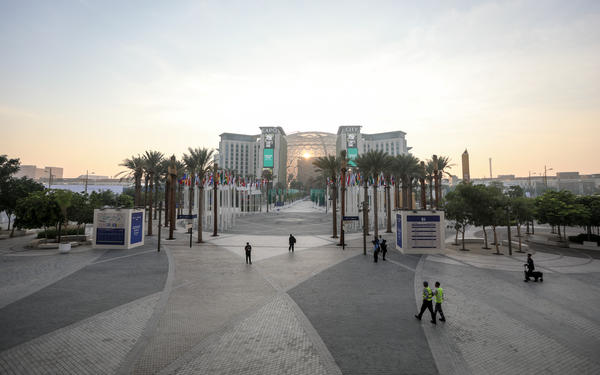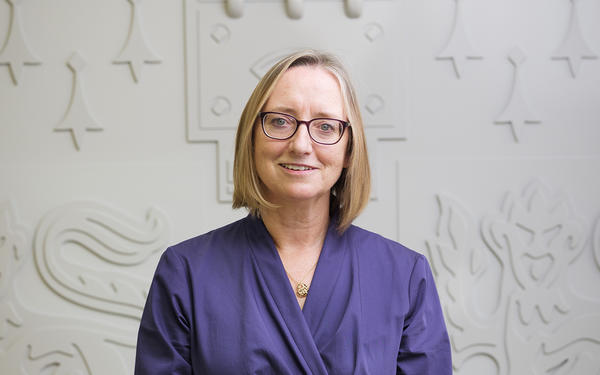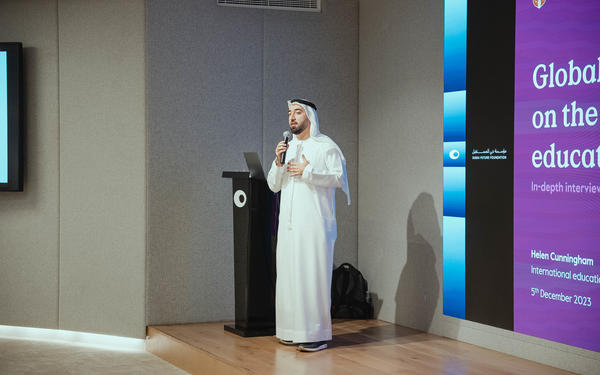The role of education in tackling the climate crisis – three takeaways from three events at COP28
In December last year, the crucial role education must take in combatting the climate crisis was, for the first time, addressed at the 28th COP summit. And this was not a moment too soon; weather-related disasters occur almost five times as frequently as forty years ago, disrupting the education of 40 million children a year. Against this backdrop, the summit in Dubai marked a moment for the global community to recognise the central role education transformation can play in driving innovative solutions to the climate crisis.

1. Businesses and policy makers should work together to reap the benefits of climate-ready education systems
We all have a role to play in the fight against climate change. Education and business leaders must take decisive action to shape the world’s ability to evolve and to unlock skills and jobs appropriate to a changing environment.
During the RewirEd summit, which took place in the second week of COP28, Cambridge’s Global Director of Climate Education, Christine Özden and David Boutcher of the Global Business Coalition for Education met on a panel to discuss synergies between corporate ESG initiatives and education reform.
Green growth could produce up to 60 million additional jobs globally. But if we are to ensure a skilled and educated workforce are capable of fulfilling those jobs, learners must be able to access quality education in the face of increasing climate disruption.
As is the case with how we approach the climate crisis more broadly, preparation is better than cure. Resilient, prepared education systems are capable of not just managing and mediating crises in the moment but are able to make decisions now to pre-empt future challenges.
Read more about building ‘climate ready’ education systems.
2. ‘Education saves lives’
At a workshop at the Greening Education Hub, Özden emphasised the importance of high-quality education to tackle climate change and how “context is crucial”.
Coherent education systems matter: “A system is regarded as ‘coherent’ when the national curriculum content, textbooks, teaching content, pedagogy, assessment and drivers and incentives all are aligned and reinforce one another.”
She went on: “Education builds the knowledge, competencies, and skills necessary to adapt and innovate to save our planet, transforming economies, and improving health and security. It particularly benefits vulnerable groups that are disproportionately affected by climate change.
“Quite simply, and bluntly, through the avoidance of disaster-related deaths, education saves lives.”
Read more from Özden’s speech

3. We must look ahead with creativity to drive true transformation for learners
At the midway point of the summit, Cambridge, and hosting partners The Dubai Future Foundation invited government, education organisations and youth leaders to discuss what schooling will look like 30 years from now. A ‘futures-thinking’ approach was employed by participants to anticipate plausible future directions, prompting questions such as how will schooling need to respond to the increase in climate-related issues? What will be the opportunities – and challenges – afforded by technology? What about potentially widening equality gaps?
His Excellency Dr Mohamed Al Mualla delivered a keynote speech on the UAE’s pioneering education journey. His Excellency explored the value of preparedness, discussing how the UAE’s pivot to online learning within a week of the Covid-19 pandemic closing schools across the country was enabled by earlier action.
Right Honourable Charles Clarke, former UK Secretary of State for Education raised how, as we look to the future and consider what the role of schools can and should be in delivering education, we must ask how we can ensure equitable access to hybrid learning as well as how can we strike a balance between immersive technologies and maintaining the value of traditional in-person education.
We’ll be sharing more insights from the discussion in the coming months, culminating in a report for governments and organisations around the world.

